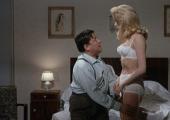Venus in Fur, Theatre Royal Haymarket review - pain and pleasure in a starry two-hander

It's Fifty Shades of Auditioning in this tricksy erotic comedy
A hit on Broadway, David Ives’s steamy two-hander now boasts Natalie Dormer and David Oakes, well-known for their screen work, in its West End cast, with Patrick Marber on directing duties.









